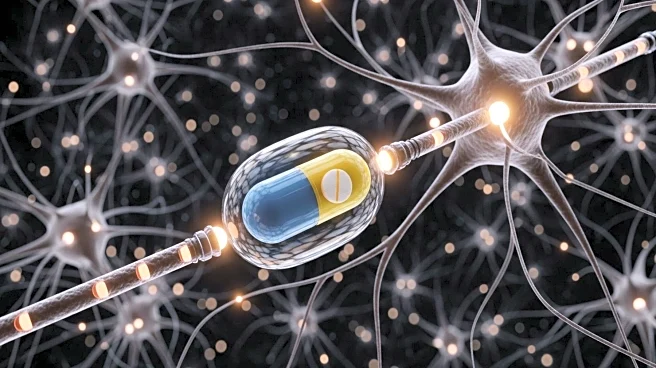What is the story about?
What's Happening?
Mercury Bio has reported positive results from a preclinical study using its yeast exosome-based drug delivery system, yEV™, to transport proteins across the blood-brain barrier. The study demonstrated successful intracellular delivery of nanobodies into neurons, potentially opening new therapeutic pathways for neurological diseases like Alzheimer's and Parkinson's. Conducted at Vanderbilt University, the study used confocal microscopy to show abundant protein delivery to neurons, with limited distribution to other brain cells. This breakthrough could address the challenge of delivering biologic-based treatments to the brain, which has been hindered by the selective nature of the blood-brain barrier.
Why It's Important?
The positive results from Mercury Bio's preclinical study represent a significant advancement in drug delivery technology for neurological diseases. The ability to transport proteins across the blood-brain barrier could lead to more effective treatments for conditions like Alzheimer's and Parkinson's, which have been difficult to address due to the barrier's selective nature. This breakthrough highlights the potential of exosome-based platforms in overcoming delivery challenges and improving therapeutic efficacy. The study's findings could pave the way for new research and development in neurodegenerative disease treatment, offering hope for patients with limited options.
What's Next?
Following the promising preclinical results, Mercury Bio will likely continue its research to refine and optimize the yEV™ platform for clinical applications. The company may explore partnerships and collaborations to advance the development of this technology for treating neurological diseases. Regulatory pathways for clinical trials and potential FDA approval will be key considerations as Mercury Bio moves forward. Stakeholders in the field of neurology and drug delivery will be keen to see how this technology can be integrated into existing treatment protocols and its impact on patient outcomes.
Beyond the Headlines
The development of Mercury Bio's drug delivery technology raises ethical and scientific questions about the future of treating neurological diseases. The ability to deliver biologics to the brain could transform the landscape of neurodegenerative disease treatment, emphasizing the importance of innovation in overcoming biological barriers. The technology's potential to improve patient outcomes also highlights the need for careful consideration of safety, efficacy, and accessibility. Long-term, the success of such delivery systems could lead to a shift in how neurological diseases are managed, prioritizing targeted and personalized treatment approaches.















